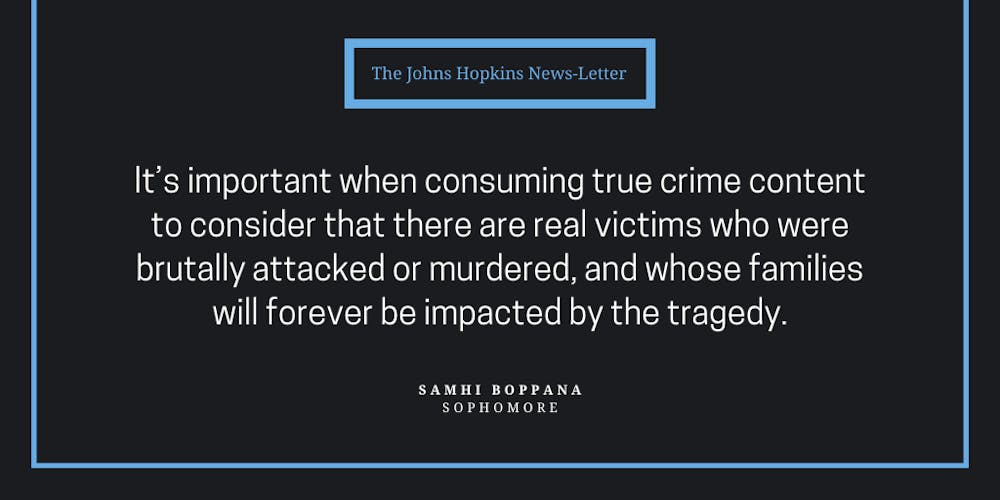True crime, a genre of media that tells the stories of real-life crimes committed by and against real people, has boomed in popularity in recent years. There are hundreds of true crime YouTube channels, podcasts and numerous Reddit threads, including r/truecrime and r/truecrimediscussion, for people to hear and discuss true crime stories.
In 2020, the third most popular podcast genre on all platforms was true crime, including hot shows like My Favorite Murder and Crime Junkie. True crime has also permeated into traditional media, with the rise of true crime content on streaming services, such as the DAHMER — Monster: The Jeffrey Dahmer Story series on Netflix, and Hulu’s Death in the Dorms.
The consumption of true crime content can quickly turn into voyeurism and finding entertainment in the horrific stories of victims. People want more details — details that they, not being law enforcement and having no connection to the victims, don’t deserve. Knowing these details won’t help them remember the victims but only satisfies their morbid curiosity to know more.
For example, in the recent Idaho murders, there was public frustration that police did not release more details of the horrific slaying of four college students in the small college town. Law enforcement has a job to do, and in the case of the Idaho murders, they did it very well, apprehending a suspect in less than two months. The public is not owed details of a crime beyond what is relevant to their own safety no matter how curious or interested they are.
It’s important when consuming true crime content to consider that there are real victims who were brutally attacked or murdered and whose families will forever be impacted by the tragedy.
The rise of hundreds of true crime podcasts and videos that retell the same solved story over and over again is commodifying the pain of other people. The case is closed, the perpetrator is in prison and victims or their families are trying to move on. Continuing to bring up and speak about the details of a case in the name of awareness, without knowing the wishes or having the consent of the victim and their family, can be predatory.
A major exception is when the victim has given approval or has the agency to tell their own story. For example, the popular show on Hulu I Survived... documents victims retelling their stories, and some shows feature the families of victims or focus more on the techniques used by law enforcement.
Netflix’s DAHMER — Monster: The Jeffrey Dahmer Story recently received criticism from families of Jeffrey Dahmer’s victims, who were not notified that the murder of their loved one would be depicted in the Netflix series. Family member Eric Perry argued that the series was “retraumatizing” his family. True crime documentaries can cross the line from making sure victims are remembered to glorifying the crimes they suffered.
A more ethical approach could be as seen in the show The Good Nurse about nurse Charles Cullen, who murdered the patients in his care. The producers made a conscious choice not to use the names or depictions of real-life victims.
True crime media is hugely successful and won’t be leaving anytime soon, but at least in this way, the story can be told without shining an unwanted spotlight on victims who are trying to move on.
Particularly egregious is the popular YouTube channel of Bailey Sarian, who gained six million subscribers from doing makeup while discussing a true crime case. I personally watched her videos for several years and previously enjoyed them.
However, when I considered her content more deeply, I found it very unsettling that while she describes how Jeffrey Dahmer brutally murdered and cannibalized young boys or how Richard Ramirez terrorized Los Angeles by raping people in the safety of their homes, Sarian is doing a smokey eye or lining her lips. It desensitizes us to the seriousness and horror of these crimes.
True crime should be unsettling. It should be evocative. It should not be told cavalierly while doing your makeup.
True crime can also breed fear and paranoia. A recent trend on TikTok involves creating a “If I Go Missing Folder,” with locks of one's hair, pages of final wishes, fingerprints and more. While I understand that doing this can make people feel more in control and may help law enforcement one day, I do think it is important to remember that you are almost twice as likely to be killed in a car accident than in a homicide.
Murders are rare, and serial killers are even rarer. But when you consume a disproportionate amount of true crime content, it is easy to become consumed by fear.
There are ways to be an ethical true crime viewer, specifically relating to cold cases and wrongful convictions. The surge of interest in true crime has contributed to renewed attention on cold cases, making it more likely for tips to come in and investigators to continue their work, and attention on possible wrongful convictions or unfair trials.
I understand the appeal of true crime. As someone interested in pursuing a career in criminal justice, I enjoy learning about the tools police use to solve crimes or exonerate suspects. However, I am also keenly aware that there are victims who have had horrifying experiences, and they and their families are just trying to pick up the pieces. A morbid interest in true crime is a natural human tendency, but when it adds to the pain of victims and their families, there must be a reckoning for all of us about what should constitute entertainment.
Samhi Boppana is a sophomore from Dublin, Ohio, majoring in Political Science and Molecular and Cellular Biology.





